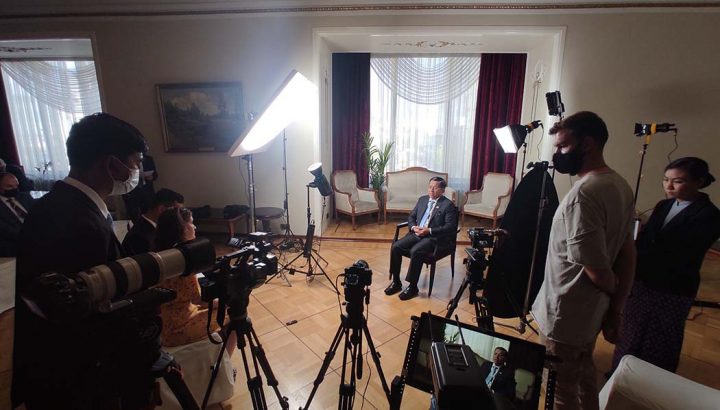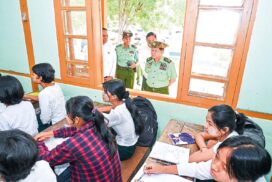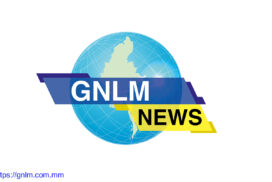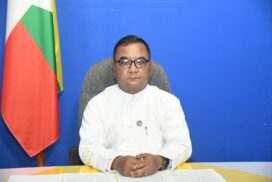Chairman of the State Administration Council Commander-in-Chief of Defence Services Senior General Min Aung Hlaing on 24 June received Special Correspondent Ms Kukushkina Tatiana of RIA news agency of the Russian Federation at Metropol Hotel in Moscow of Russia and replied to queries.
The questions and answers were mentioned as follows: –
Q: This is not the first time of trip for you to attend the International Security Conference in Moscow. At the 9th conference, we saw your discussions on security measures on the Asia-Pacific Region. Can you add your discussions on the security measures on the ground?
A: First and foremost, I’d like to discuss that the Asia-Pacific Region is an area in which the world powerful countries have been very interesting after the Second World War. The Pacific region, the Atlantic region and European frontlines are of great importance during the Second World War. The global countries are interested in the Far East and the Asia-Pacific Region. So, I’d like to note that it is necessary to take care of security measures in all tasks related to politics. For example, the Vietnamese war was one of the wars which happened after World War II. It can be said that it is an interest of the Asia-Pacific Region in Southeast Asia.
Q: With regard to the security measures at present, what are the dangers for the world?
A: There are many forms of danger. These are terror attacks. Moreover, we can see many items of influence over the countries with the purposes of politics, economics, peace and stability. I’d like to say these are dangers.
Q: We have heard that you held a meeting with Minister of Defense of Russia Army General Sergey Kuzhugetovich Shoigu on this trip to Russia on the cooperation in military technology. In this regard, what kinds of sectors for cooperation in military technology will be further extended? May I know new stories?
A: There are many sectors. It may be wider. We held discussions on many topics. So, it is not new. We focused on further extension of existing work processes. We don’t have new plans. Since starting, we operate a wider scale of sectors.
Q: What kinds of work fields do you further extend?
A: Yesterday, we discussed measures about air defence but it was not special. It is because there is much potential for imposing danger of air strikes into the international community. We don’t have adequate finance to be powerful Myanmar’s air force against the airstrikes. So, we focus on measures of air defence. It was included in yesterday’s discussions.
Q: Our Russia and Myanmar are partner countries that would not stop their relations not just in military-technological cooperation. Do you have any plans to cooperate in other sectors?
A: It would be in various sectors. For example, we will cooperate in an extension of Tatmadaw (Navy), communications and technology. Detail information will be larger but it should not be disclosed.
Q: Let me ask a question on the current internal affairs of Myanmar. The expressions in the world’s media on Myanmar are very different from the realities in Myanmar, we Russia knew. Why do the world’s media mention the reverse forms instead of the realities? Why do you review it?
A: Mainly, I assume it is a trend of undermining the current our management and of making attempts to create the positions for those they give favour.
Q: Do you mean western countries?
A: Yes, of course.
Q: Do western countries write in the media? Or do they broadcast these items of false news as diplomats of relevant countries?
A: Of course. They do so much. Those from the diplomatic arena so do and the agencies under the United Nations also do it as well. NGOs and INGOs also commit so. The media arena also so does.
Q: According to the findings on observation over the constitution of Myanmar, Russia sees there is no post of State Counsellor in the constitution. But, Daw Aung San Suu Kyi in the previous government term took the power of the State for a long time with the post of State Counsellor which is not mentioned in the constitution. Why does such a situation emerge? Why do you think how she considered doing so?
A: The post of State Counsellor was created herself. The constitution comprises a section that duty can be assigned to any organization or person. They created such a post in line with that section. But, it is authority. We have three powers as the authority. These are legislative power, executive power and judicial power. No one can do anything to influence these three powers. These three powers are the highest organizations. Nobody can be beyond these powers. Any law cannot be promulgated beyond the constitution. But, she grasped the post beyond the constitution.
At this junction, I’d like to note that Section 59 (f) of the constitution stipulates the restriction for relations of a citizen with a foreigner. Her event gets entangled with such restriction. She gets entangled with the qualification for the president. So, she enacted the law on the state counsellor and took such a post. Criteria of qualification for the post of president and vice president are inclusive of Section 59 (f) of the constitution. When she was appointed as the state counsellor, she inserted her post into the protocol between the president and the vice president under the gazette. Actually, the person of the state counsellor must be inclusive of Section 59 (f). But, she evaded the provisions of the constitution. She could not be free from such a point. As further clarification, our country exercises the protocol of the positions. It comprises 25 positions: the president, followed by vice-presidents, the speakers of Hluttaw. Such kinds of the protocol are exercised in the international community. In your country, who is the most responsible after the President? How is the third responsible? It is protocol. The protocol is issued in an official letter. So, she issued the official State gazette signed by the president, mentioning that she took the second position. So, I say she gets entangled with the law. If she is outside the protocol without the issuance of the ga zette, it is no problem. But she officially issued the letter.
Q: We know some prosecutions against Daw Aung San Suu Kyi. What kinds of criminal cases can be adopted for punishing her? Did foreign countries demand over such cases? Please explain the demands of these countries.
A: It is not easy to say as I am not a judge. So, the judge will adopt decisions over the accusation of her at the trial based on the rationality of the judge. Prosecuted organizations sued her depending on their findings. But, the judge will adopt decisions after performing the inquiry.
Q: The government of the State Administration Council initially said the election would be held within one year. Recently, you told me the election would be held within two years. Please explain such a matter.
A: The results of the election were scrutinized by the Tatmadaw at first and then released. It announced the wrong voter lists. When I took the responsibilities, the Union Election Commission called UEC was reconstituted and assigned to inspect the voter lists. Depending on its findings, we issued the statements. So, if these tasks complete, we announced that we would hold the election. But the timeframe was not limited to take six months or one year. When the tasks in the state of emergency have been completed, I will make efforts to hold the election. I will perform to form the government by the elected party. I will hand over the responsibilities to it. I said so.
For further fact, the main theme of errors in the voter list is the lack of citizenship scrutiny cards. Those non-CSC holders were involved on the voter lists. More than 10 million people without CSC were involved on the voter lists. In scrutiny, it is important to issue CSC to more than 4 million people urgently. Now, CSCs are being issued to them. Relevant officials estimate it needs to take at least 18 months for issuance. In so doing, it is necessary to issue the cards to 300 persons per day.
Only when CSCs are issued to 300 persons per day, will it be completed within 18 months. Otherwise, it needs to take a longer time.
We pointed the error voter list was based on those without CSCs. So, it will be guilty if we compile the voter lists comprising those with no CSC so as to hold the new election. So, the issuance of CSC is prioritized. Such process has completed, we can hold the election based on correct data. So, we need to take adequate time. So, I said it needs to take about two years for the election.
For another point, we exercise the 1982 Myanmar Citizenship Law. It can be applied to give citizenship to relevant persons. It is a duty not to take a long time during the election period. So, we hold discussions with relevant persons. It should not be delayed. If it delays, it will make a problem. I’d like to say we have such a task.
To be continued













